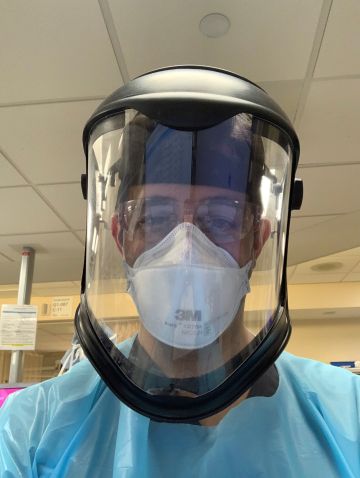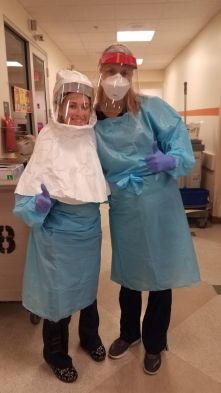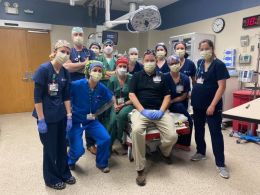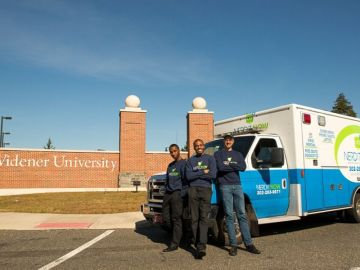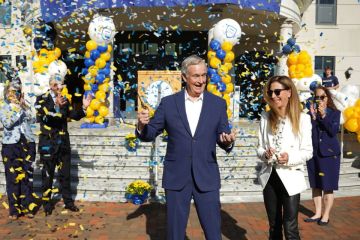Widener Alumni Lead on the Front Lines of the Coronavirus Response

Widener University alumni are leaders in their fields—and now they are using skills learned at Widener to serve on the front lines of COVID-19 responses.
They are nurses and doctors. They are social workers and teachers. They are journalists, business owners, financial advisors, and more.
"We are grateful to the many Widener alumni who are leading their communities through these unprecedented times. They are showing incredible bravery, generosity, and perseverance that makes us all proud to call them part of the Widener family," said Jessica Lista, executive director of Alumni Engagement.
Read the stories of some alumni leading through the crisis:
At the Heart of Pandemic
As an emergency physician, Nicholas Caputo ’03 works well under pressure.
On any given day, Caputo expects his emergency department to serve approximately 350 to 450 patients—and that is without a global pandemic. When COVID-19 swept his community in the South Bronx, that number soared and shocked the New York City public health and hospital system.
“This disease is like nothing we’ve ever seen,” said Caputo, a biology graduate.
As associate chief in Lincoln Medical Center’s Department of Emergency, Caputo is well versed in the challenges of addressing high patient volumes with tight resources and limited staff. When the pandemic hit, Lincoln Medical Center, like many hospitals in the country, experienced an overwhelming surge of critically ill patients, many of whom presented with respiratory distress and required intubation and assistance from a ventilator.
Limited data on the virus mixed with the initial influx in patients led medical staff to identify unconventional treatments to meet the unprecedented situation.
“We’re coming up with innovative practices to treat patients and try to keep them from dying,” said Caputo.
Caputo and his colleagues in the medical community are turning to a technique known as “proning,” which has proven useful in patients with pneumonia. The technique calls for patients with low oxygen levels to lay on their stomach or side to improve oxygenation without a ventilator.
Caputo credits this creative thinking in part to lessons learned from his biology professor and longtime mentor David Coughlin.
According to Caputo, Coughlin “was the one that really instilled in me that you can think your way out of almost any situation.”
The two still keep in touch, and this reminded Caputo to stop and think through the problem.
“That’s exactly what we’re doing now—we’re thinking through the problem, except we’re doing it at an ultra-fast pace in order to save lives,” he said.
Dissertation in Action: Teaching Teachers How to Instruct Online
When Kim-Kathie Knudsen graduated in December with a doctoral degree in K–12 educational leadership, she knew her dissertation on face-to-face and online teacher professional development would be useful.
She never realized, though, just how imperative it would become.
Coronavirus forced schools across the country to close starting in March. Knudsen, the Palmyra Area School District’s supervisor of instructional technology and online learning, had to train the Pennsylvania district’s 160 teachers for online instruction almost overnight.
When this first happened, I was able to put my dissertation into action. As part of my research, I knew that communications need to be very, very clear. — Kim-Kathie Knudsen '19
Knudsen kept in mind that teachers, like students, all learn differently. For some teachers Knudsen could provide links to online resources; while for others, she needed to answer questions live in online office hours.
Knudsen also helped the district navigate the unique challenges that come with online instruction at every age. While the district’s 6th–12th grade students each had a device, the younger students did not. The district implemented a plan to loan a device and internet hotspot to each family that did not have technology access.
At each step, Knudsen used her leadership training from Widener and sought advice from Associate Professor Zora Wolfe.
“Everything at Widener prepared me for this,” Knudsen said.
A New Kind of Emergency Care
The health care industry has arguably been one of the hardest hit sectors during the coronavirus pandemic.
Seemingly overnight, hospitals across the country were forced to make significant operational adjustments to meet the increased level of patient care.
For nursing alumni like Michelle Garro '16 and Katelyn DeVecchis '17, every day presents new challenges.
At Christiana Hospital in Delaware, Garro says that not fully understanding the virus and how it manifests in each patient presents difficulties for diagnosis and treatment.
“We’re all learning about this virus together. Every day the guidelines change, and every day we have new data as information evolves,” said Garro.
As data continues to develop, the first priority remains the patients—those with and without COVID-19.
“It’s in the back of everyone’s mind, but we still have patients coming in every day with emergency needs,” said Garro.
Nursing staff at the Children’s Hospital of Pennsylvania (CHOP) are experiencing an influx of patients with the coronavirus, as well, although not to the level of providers who serve the adult population.
“At the moment, we’re not nearly seeing the surge that adult hospitals are, which is a blessing,” said DeVecchis, who works in CHOP’s emergency department.
While the virus hasn’t been shown to affect children as severely as older adults, DeVecchis is mindful of the destruction this pandemic can cause through unforeseen negative effects on the behavioral and psychiatric health of vulnerable children.
“We are unfortunately seeing a lot of people and families in crisis, especially when you think about child abuse, and they’re now all home together,” said DeVecchis.
Widener nursing faculty, like Brenda Kucirka, taught DeVecchis to care for the whole patient, not just the symptoms, which during these unprecedented times means providing more education and resources for children and families in need.
“Some people need the education that you can provide, which truly I think has come from a behavioral health and psychiatric standpoint that Dr. Kucirka has engraved in me.”
Guidance from nursing faculty during her time as an undergraduate led DeVecchis to envision her career in emergency medicine.
“They told me I had ‘an emergency department attitude’.”
At the time, DeVecchis didn’t know what that meant. Looking back now, she added, “they were right.”
Technology for Underprivileged Communities
As founder of NERDiT Now, Markevis Gideon ’10 has been donating computers to underprivileged students and communities since he founded the company in 2015. Now, these donations have become even more important with the sudden shift to online learning and working.
In response to coronavirus, the technology repair company initially received a $75,000 grant to supply computers to 150 local nonprofits. The company has even loftier goals of distributing 20,000 computers to school districts in Pennsylvania and Delaware.
“I know what it feels like to be a student in need of computer access, and I also know what it feels like to have received the help that I needed,” said Gideon, who was a computer science and accounting major. “We want people to realize that technological barriers are a very real problem for many students regardless of what else is going on in the world.”
To reach the goal, Colonial Parking in Wilmington, Delaware, generously donated NERDiT 10,000-square-feet of space for three months. Gideon is using the space to refurbish technology, while taking all the necessary precautions, including social distancing and hand sanitizing, to ensure the safety and health of NERDiT Now employees.
Gideon points to his time at Widener as a key component in his desire to give back.
“I am still deeply connected to many people at Widener, and I am forever grateful to the university for igniting my entrepreneurial passion and instilling civic engagement as one of my ideals,” he said.
Many Widener alumni have shared their stories amid the COVID-19 pandemic. We encourage you to continue sharing your stories and follow the hashtag #WUDayofSharing to see more from Alumni Engagement.

